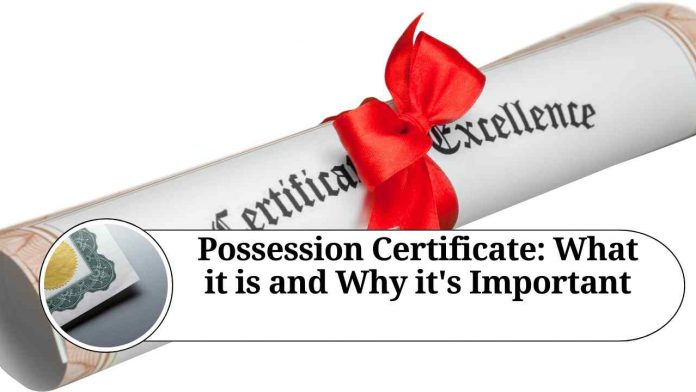INTRODUCTION
The possession certificate is important for a number of reasons. Firstly, it is required when you want to sell or transfer ownership of the property. Without a possession certificate, it can be difficult to prove that you have legal possession of the property, which can create problems when it comes to the sale or transfer of ownership.
Secondly, a possession certificate is also important when you want to apply for a loan or mortgage. Banks and other financial institutions will require proof of ownership before they lend you money, and a possession certificate is one of the most important documents they will ask for.
Thirdly, a possession certificate can also be useful in legal disputes. If there is a dispute over ownership of a property, the possession certificate can be used as evidence in court to prove that the person or entity named on the certificate is the rightful owner.
To obtain a possession certificate, you will need to submit an application to the local government or municipal authorities. The application process will usually require you to provide proof of ownership of the property, such as a sale deed or a property tax receipt.
Once your application has been processed, the authorities will conduct a verification process to ensure that you are the legal owner of the property. If everything checks out, they will issue you a possession certificate.
It is important to note that a possession certificate is not the same as a property registration certificate. While a possession certificate certifies that you have legal possession of the property, a property registration certificate is a more comprehensive document that includes details such as the location of the property, its dimensions, and the name of the owner.
Another benefit of having a possession certificate is that it can be used to obtain other important documents related to property ownership, such as building permits and property tax receipts. These documents are essential for maintaining and improving the property, and they are often required when seeking financing or applying for government subsidies.
In some cases, a possession certificate may also be required in order to receive compensation for damage or loss of property due to natural disasters, accidents or other unforeseen events. For example, if a property is damaged in a flood, the owner may need to provide a possession certificate as proof of ownership in order to claim compensation from the relevant authorities.
It is important to note that possession certificates may have different names and formats depending on the country or region in which they are issued. In some places, they may be called occupancy certificates, ownership certificates or title deeds. It is important to understand the specific requirements and regulations in your area in order to ensure that you obtain the correct document.
conclusion
possession certificates are an essential document for anyone who owns a property or land. They provide proof of ownership and help to prevent disputes and fraudulent transactions. If you own a property or land, it is important to obtain a possession certificate in order to protect your ownership rights and ensure that you have access to important documents and services related to property ownership.
Other Related Blogs: Section 144B Income Tax Act
Frequently Asked Questions (FAQs)
Q: What is a possession certificate?
A: A possession certificate is a legal document that certifies ownership of a particular property or land. It is issued by the local government or municipal authorities and serves as proof that the person or entity named on the certificate has legal possession of the property.
Q: Why is a possession certificate important?
A: A possession certificate is important because it provides clarity and transparency in property ownership. It is required for a number of legal and financial transactions, and can also be used as evidence in legal disputes. Without a possession certificate, it can be difficult to prove that you have legal possession of the property, which can create problems when it comes to the sale or transfer of ownership.
Q: What is the process of obtaining a possession certificate?
A: To obtain a possession certificate, you will need to submit an application to the local government or municipal authorities. The application process will usually require you to provide proof of ownership of the property, such as a sale deed or a property tax receipt. Once your application has been processed, the authorities will conduct a verification process to ensure that you are the legal owner of the property. If everything checks out, they will issue you a possession certificate.
Q: Is a possession certificate the same as a property registration certificate?
A: No, a possession certificate is not the same as a property registration certificate. While a possession certificate certifies that you have legal possession of the property, a property registration certificate is a more comprehensive document that includes details such as the location of the property, its dimensions, and the name of the owner.
Q: What are the benefits of having a possession certificate?
A: The benefits of having a possession certificate include providing proof of ownership, obtaining other important documents related to property ownership, preventing disputes and fraudulent transactions, and being able to claim compensation for damage or loss of property.




















